|
|
|
|
|
Amnesty International Bournemouth Poole Christchurch Group
local news & events Amnesty International group for Bournemouth, Poole & Christchurch
by zarganar
|
|
|
|
|
by zarganar
Here is our latest Newsletter with updates and actions.
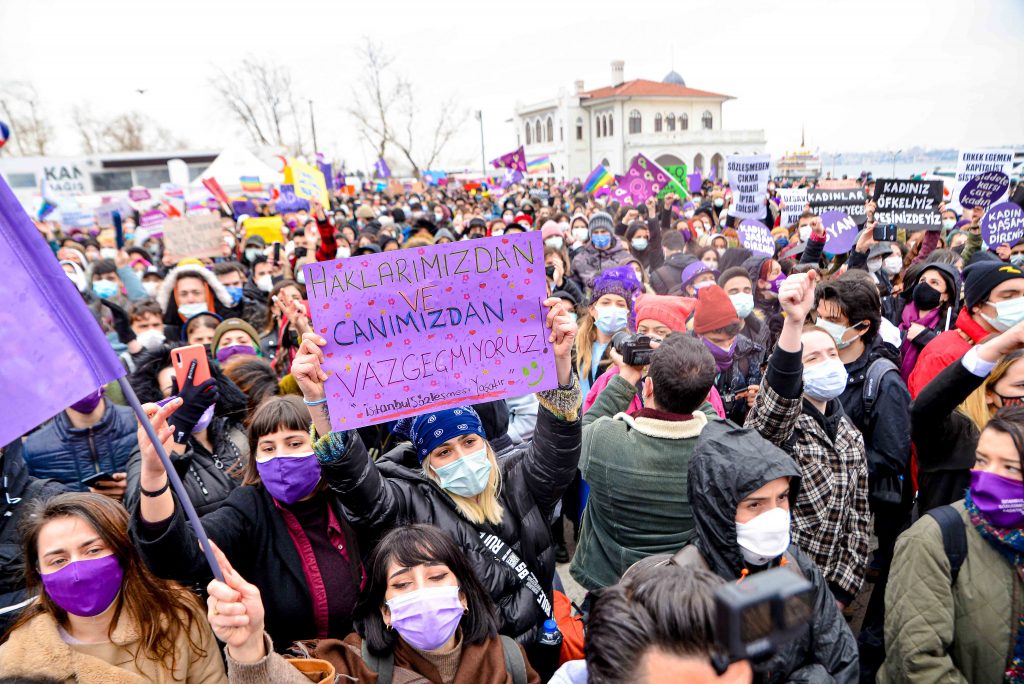
On 22 December 2021 Amnesty International published a new briefing document setting out an analysis on the current situation regarding violence against women in Turkey, including a summary of the obligations of the State to respect, protect and fulfil women’s right to be free from violence. Entitled “Turkey, Turn Words Into Actions” it provides an overview of the incredible pressure that women are under in Turkey and sets out the government’s obligations to protect women’s human rights based on a review of Turkish legislation, the recommendations by UN treaty bodies, the Council of Europe, and other relevant international organisations, as well as consultations with women’s rights organisations in Turkey.
Please do have look at the full document which can be accessed through the link shown below:
https://www.amnesty.org/en/documents/eur44/5109/2021/en/
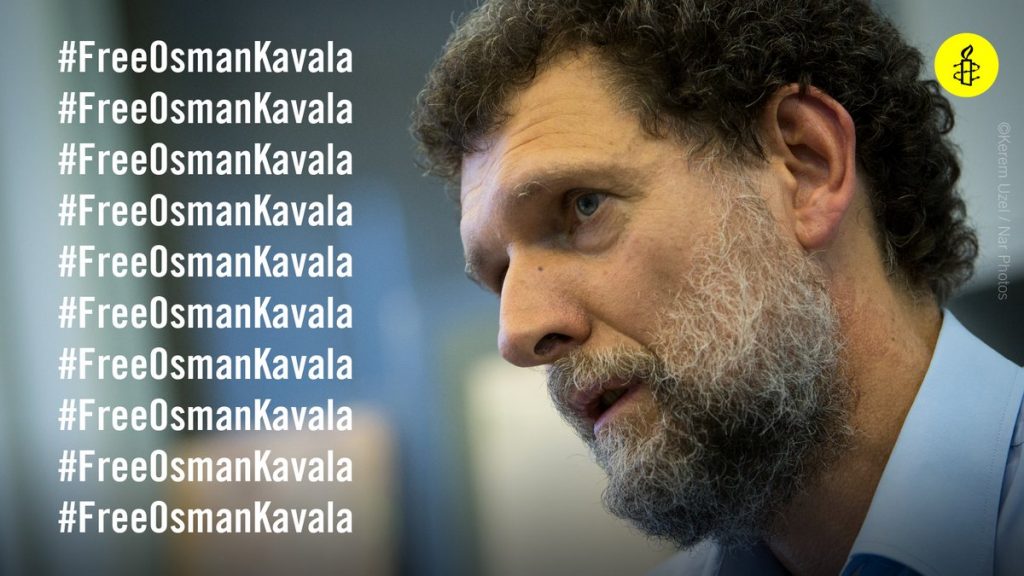
On Monday 17 January a Turkish court extended the detention of a civil society leader, Osman Kavala ignoring a deadline from Europe’s top human rights body to release him.
Osman Kavala, 64-year-old businessman and philanthropist, has been held without a conviction since October 2017 for allegedly financing the Gezi Park 2013 anti-government protests and playing a role in an attempted coup against President Recep Tayyip Erdoğan in 2016. But an İstanbul court on Monday turned down a motion from Kavala’s defence for his release, scheduling a new hearing for Feb. 21.
Turkish authorities now have until 2 February before the Council of Europe will serve formal notice of its intention to refer Turkey back to the European Court of Human Rights (ECtHR) for infringement proceedings.
In its last Human Rights meeting in early December, the Committee of Ministers (CM) of the Council of Europe voted on majority to initiate infringement proceedings against Turkey and gave the authorities until 19 January 2022 to provide a report about Osman Kavala’s imprisonment until this Wednesday to release him from pre-trial detention in line with the December 2019 Kavala v Turkey decision of the European Court of Human Rights.
In the absence of the implementation of the decision, the CM is expected to send the non-implementation of the binding Kavala decision back to the ECtHR at its next meeting on 2 February 2022. It is only the second time since the introduction of the infringement procedure in 2010 that a country is being referred back to the Court for non-implementation of its decisions.
The refusal to release Kavala in line with the ECtHR ruling and nine decisions of the CM since May 2020, and the start of the infringement proceedings indicates a very serious deterioration in of the Human Rights situation in Turkey. The case is undoubtedly souring Turkey’s ties with its traditional Western allies. Please follow the link below for a local report on case: https://bianet.org/english/law/256322-gezi-trial-osman-kavala-not-released-again?bia_source=rss&utm_source=dlvr.it&utm_medium=twitter [Read more…]
by zarganar
Thank you for following us and taking actions on human rights’ issues this past year. This month we bring you news from Paraguay, Colombia, Venezuela, Brazil and Chile. We have a new Urgent Action to free a prisoner of conscience in Venezuela, a petition to sign on sexual violence against children and adolescents in Paraguay and good news from Brazil. We report on the continued violence in Colombia and further criticism from international agencies on police repression of the National Strike. There is good news for indigenous communities in Paraguay while in Colombia the IACHR finds them at great risk.
PARAGUAY
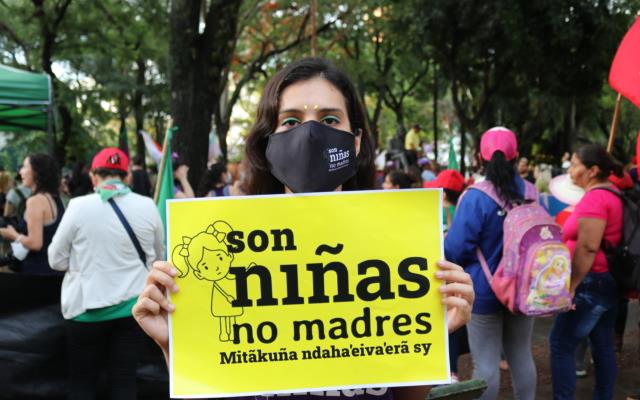 On 1 December, Amnesty published a new report about sexual violence against children and adolescents in Paraguay. For girls, this often results in forced pregnancies, truncated childhoods and abandonment of their future ambitions. Here are eight facts to underline the seriousness of the issue. According to the findings, the highest authorities in Paraguay are not listening to professionals working on the issue. You can support the accompanying campaign by signing this petition and by posting on social media using the material available here.
On 1 December, Amnesty published a new report about sexual violence against children and adolescents in Paraguay. For girls, this often results in forced pregnancies, truncated childhoods and abandonment of their future ambitions. Here are eight facts to underline the seriousness of the issue. According to the findings, the highest authorities in Paraguay are not listening to professionals working on the issue. You can support the accompanying campaign by signing this petition and by posting on social media using the material available here.
According to this news report of 28 December, the Paraguayan Government has granted land titles and financial compensation to several indigenous groups who have lost possession of their ancestral lands. This includes the Yakye Axa and the Sawhoyamaxa, for whose rights many of you have campaigned in the past. We will report further as more information becomes available. [Read more…]
by zarganar
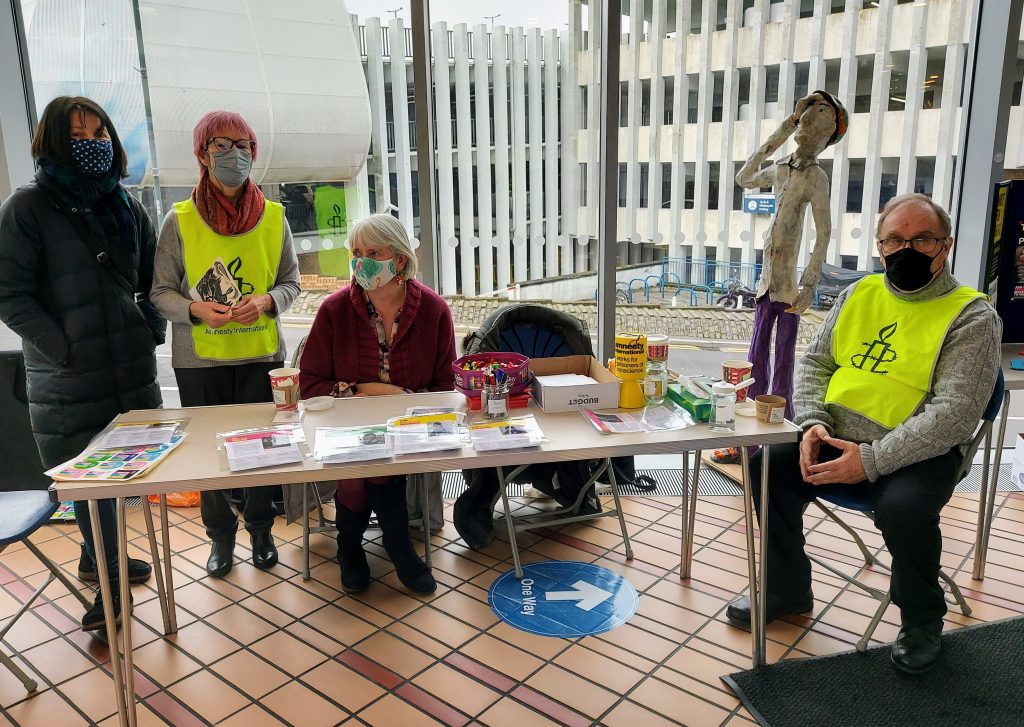
Thanks to everyone who supported us today at Bournemouth Library. It is more challenging trying to engage with passing members of the public whilst wearing a mask, but we got a very positive response. It was quieter than 2 years ago, as there were no other events at the library, and understandably fewer choosing to visit with the new mask restrictions applying.
Many thanks to the library staff for their help in facilitating this event, ensuring everything was in place for us, and then individually showing interest in the campaign and signing cards.
by zarganar
As reported in the last Europe Team Newsletter, entrepreneur and philanthropist Osman Kavala who was arrested in 2017 and charged with involvement in the Gezi Park protests and plotting to overthrow the state was due back in court on 26 November. Regrettably, at that hearing the court refused to release him from pre-trial detention and has scheduled the next hearing for 17 January 2022.
In the meantime at their meeting between on 2 December the Council of Europe’s Committee of Ministers (COM) have voted to commence infringement proceedings against Turkey because of its failure to implement what is, theoretically, a binding judgement of the European Court of Human Rights that Osman Kavala should be freed. This is good news because such a decision is incredibly rare (only taken once in the history of the Council). If Turkey does not comply it will again be referred back to the European Court of Human Rights on 20 February 2022 and this process could leads to Turkey having its voting rights removed or even expulsion from the Council.
We wait to see the response of the Turkish Government to this ruling.
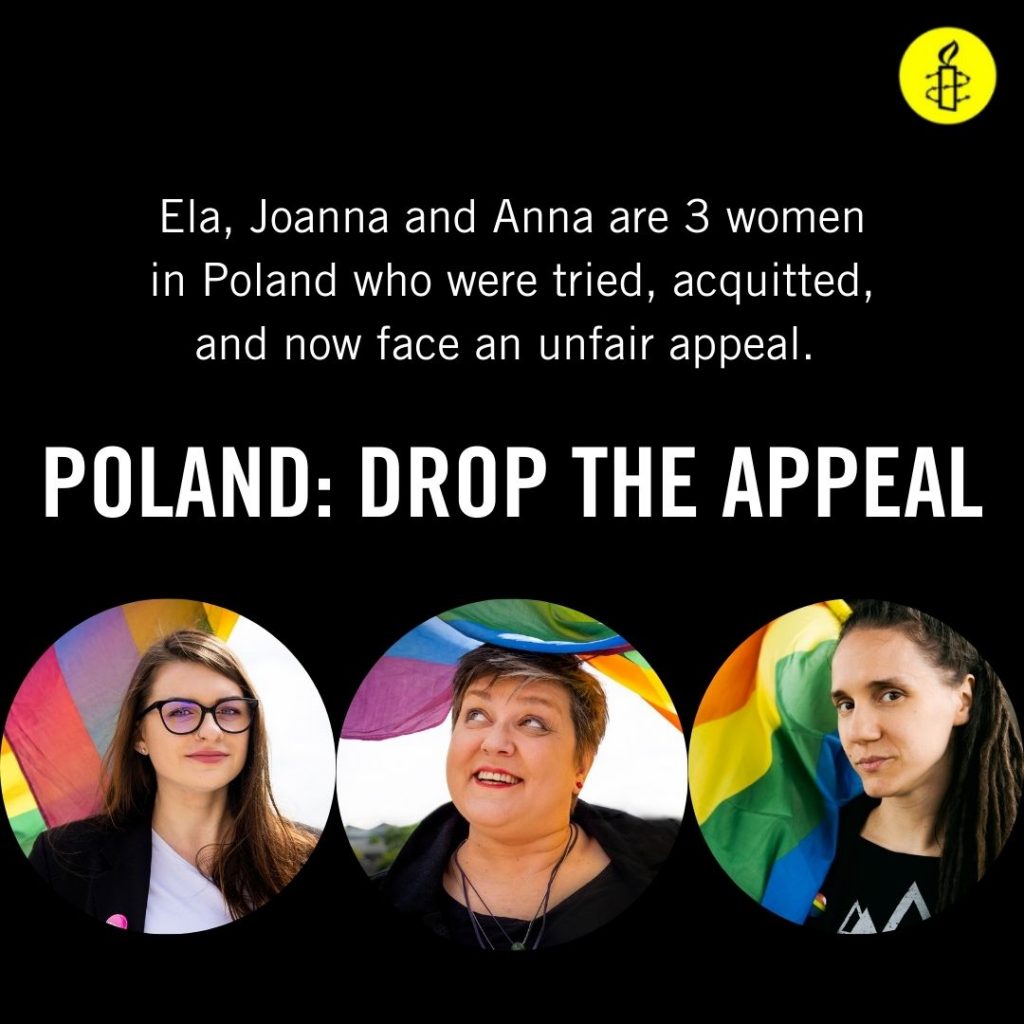 The trial against brave Human Rights Defenders: Ela, Anna and Joanna starts 8th December.
The trial against brave Human Rights Defenders: Ela, Anna and Joanna starts 8th December.
Amnesty Poland will be following the trial , reporting on Twitter, we will keep the Facebook/AmnestyUKEurope page updated with the outcome.
Elżbieta, Anna and Joanna are outspoken activists and human rights defenders from Poland. They have stood against hate and discrimination for many years and are fighting for a just and equal Poland. They have been targeted by the Polish authorities just because of their peaceful activism. Their demand for justice continues. Now, they need you to fight for them, once again.
In March 2021, Elżbieta, Anna and Joanna were acquitted after spending months on trial accused of ‘offending religious beliefs’, simply for distributing posters of the Virgin Mary with a rainbow halo, the colours of the LGBTI pride flag. The ‘not guilty ‘verdict brought a moment of huge celebrations, but their relief was short-lived. The Polish authorities are now appealing against their acquittal, so the three women’s fight for justice continues. Once again, they now face up to two years in prison, just for standing up for LGBTI rights in a climate of hate and discrimination in Poland. Sadly, their case is another example of the constant harassment activists and human rights defenders face in Poland for carrying out peaceful activism. The appeal against their acquittal shows the irrational determination of Polish authorities to use the criminal justice system to that end. Having, creating, or distributing posters such as these is not a crime; it is freedom of expression, a basic human right. [Read more…]